#Pakistan Assembly
Explore tagged Tumblr posts
Text
Ladies, vote for yourself and those denied the right
Dhurnal (Pakistan) (AFP) – Perched on her traditional charpai bed, Naeem Kausir says she would like to vote in Pakistan's upcoming election -- if only the men in her family would let her.
Issued on: 05/02/2024 - 08:41
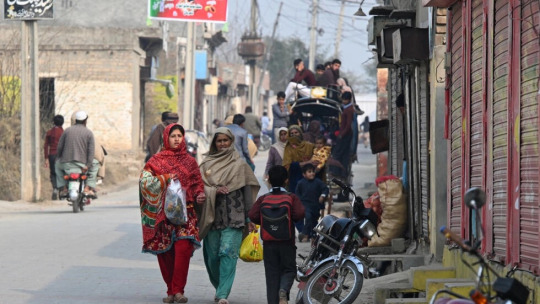
In the village of Dhurnal in Punjab, spread across crop fields and home to several thousand people, men profess myriad reasons why women should not be allowed to vote © Farooq NAEEM / AFP
Like all the women in her town, the 60-year-old former headmistress and her seven daughters -- six already university educated -- are forbidden from voting by their male elders.
"Whether by her husband, father, son or brother, a woman is forced. She lacks the autonomy to make decisions independently," said Kausir, covered in a veil in the courtyard of her home.
"These men lack the courage to grant women their rights," the widow told AFP.
Although voting is a constitutional right for all adults in Pakistan, some rural areas in the socially conservative country are still ruled by a patriarchal system of male village elders who wield significant influence in their communities.
In the village of Dhurnal in Punjab, spread across crop fields and home to several thousand people, men profess myriad reasons for the ban of more than 50 years.
"Several years ago, during a period of low literacy rates, a council chairman decreed that if men went out to vote, and women followed suit, who would manage the household and childcare responsibilities?" said Malik Muhammad, a member of the village council.
"This disruption, just for one vote, was deemed unnecessary," he concluded.
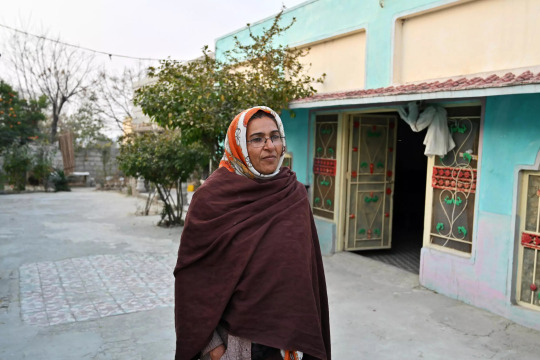
Robina Kausir, a healthcare worker, talks to AFP in Dhurnal of Punjab province, ahead of the upcoming general election © Farooq NAEEM / AFP
Muhammad Aslam, a shopkeeper, claims it is to protect women from "local hostilities" about politics, including a distant occasion that few seem to remember in the village when an argument broke out at a polling station.
Others told AFP it was simply down to "tradition".
First Muslim woman leader
The Election Commission of Pakistan (ECP) has stressed that it has the authority to declare the process null and void in any constituency where women are barred from participating.
In reality, progress has been slow outside of cities and in areas that operate under tribal norms, with millions of women still missing from the electoral rolls.
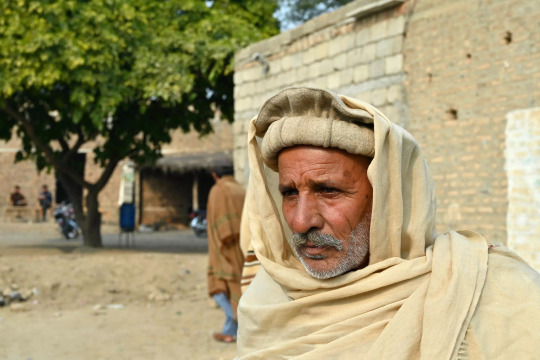
Muhammad Aslam, a shopkeeper, claims a ban on women voting is to protect them from "local hostilities" about politics © Farooq NAEEM / AFP
The elders in Dhurnal rely on neighbouring villages to fill a government-imposed quota which maintains that 10 percent of votes cast in every constituency must be by women.
Those who are allowed to vote are often pressured to pick a candidate of a male relative's choice.
In the mountainous region of Kohistan in Khyber Pakhtunkhwa province home to almost 800,000 people, religious clerics last month decreed it un-Islamic for women to take part in electoral campaigns.
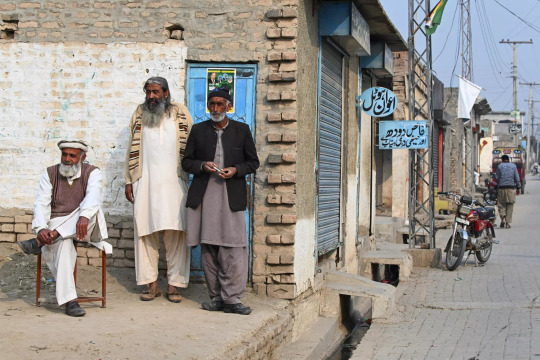
Although voting is a constitutional right for all adults in Pakistan, some rural areas in the socially conservative country are still ruled by a patriarchal system of male village elders who wield significant influence in their communities © Farooq NAEEM / AFP
Fatima Tu Zara Butt, a legal expert and a women's rights activist, said women are allowed to vote in Islam, but that religion is often exploited or misunderstood in Pakistan.
"Regardless of their level of education or financial stability, women in Pakistan can only make decisions with the 'support' of the men around them," she said.
Pakistan famously elected the world's first Muslim woman leader in 1988 -- Benazir Bhutto, who introduced policies that boosted education and access to money for women, and fought against religious extremism after military dictator Zia ul-Haq had introduced a new era of Islamisation that rolled back women's rights.
However, more than 30 years later, only 355 women are competing for national assembly seats in Thursday's election, compared to 6,094 men, the election commission has said.
Pakistan reserves 60 of the 342 National Assembly seats for women and 10 for religious minorities in the Muslim-majority country, but political parties rarely allow women to contest outside of this quota.
Those who do stand often do so only with the backing of male relatives who are already established in local politics.
"I have never seen any independent candidates contesting elections on their own," Zara Butt added.
'Everyone's right'
Forty-year-old Robina Kausir, a healthcare worker, said a growing number of women in Dhurnal want to exercise their right to vote but they fear backlash from the community if they do -- particularly the looming threat of divorce, a matter of great shame in Pakistani culture.
She credits part of the shift to access to information as a result of the rising use of smartphones and social media.
"These men instil fear in their women – many threaten their wives," she told AFP.
Robina, backed by her husband, is one of the few prepared to take the risk.
When cricketing legend Imran Khan swept to power in the 2018 election, Robina arranged for a minibus to take women to the local polling station.
Only a handful joined her, but she still marked it as a success and will do the same on Thursday's election.
"I was abused but I do not care, I will keep fighting for everyone's right to vote," Robina said.
#pakistan#Every vote counts#Men making up bs to prevent women from voting#Election Commission of Pakistan (ECP)#Men protecting women........from exercising their right to vote#Benazir Bhutto#only 355 women are competing for national assembly seats in Thursday's election compared to 6094 men
63 notes
·
View notes
Text
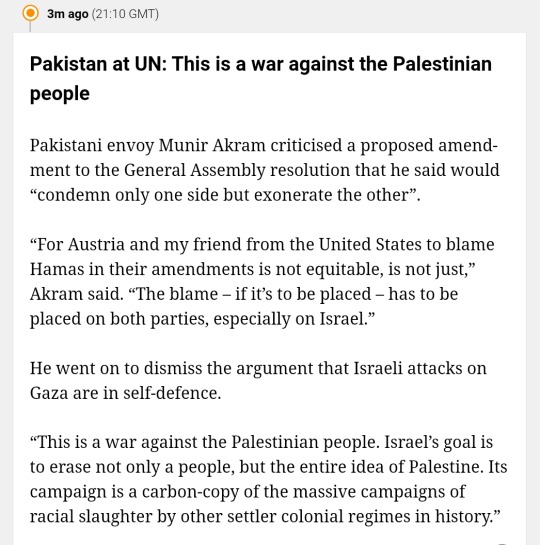
CALL EM OUT MUNIR

#free gaza#free palestine#gaza strip#irish solidarity with palestine#palestine#gaza#news on gaza#al jazeera#boycott israel#israel#Munir Akram#Pakistan#UNGA#United Nations General Assembly#I'm manic today don't @ me. I WISH I had alcohol goddamn.
47 notes
·
View notes
Text

🇵🇰🇺🇳🇵🇸🇮🇱
🚨 PAKISTAN THROWS ITS WEIGHT BEHIND A UN PROPOSAL TO PUT A PROTECTION FORCE ON THE GROUND IN THE GAZA STRIP
As the illegal Israeli siege and bombardment of Gaza continues unabated, Pakistan's Foreign Minister came out in support for a United Nations General Assembly proposal to deploy a "protection force" in Palestine.
"We need to consider ways to prevent a recurrence of this slaughter,” Pakistan's Foreign Minister, Munir Akram told the UN General Assembly.
Akram said that the foreign ministers of the Organization of Islamic Cooperation “have proposed deployment of a protection force to safeguard Palestinian civilians in the Gaza [Strip] and perhaps also in the West Bank."
"We should give serious consideration [to the proposal]," Akram said. "The Israeli killing machine must be stopped in Gaza and the West Bank.”
The Pakistani Foreign Minister went on to censure Israel's recent attacks on the United Nations Secretary General, Antonio Gutierrez who, although condemning Hamas' attacks on Israeli settlers, he also connected the attacks to the Israeli occupation and apartheid. Akram urged the General Assembly to "stand behind" the Secretary General.
"We are repelled by the crude and disrespectful Israeli response to the secretary-general’s circumspect and valid views. The General Assembly should collectively reject these insulting remarks and reaffirm our full confidence in the secretary-general,” Akram told the Assembly.
According to updated figures, some 7'326 Palestinians have been killed in Israel's attacks, including more than 3'000 children, with another 18'000 Palestinians injured.
#source
@WorkerSolidarityNews
#united nations#un general assembly#pakistan#pakistan news#palestine#palestine news#occupied palestine#gaza#gaza strip#gaza war#gaza news#free gaza#free palestine#israel#israel news#israeli war crimes#war crimes#crimes against humanity#israeli occupation#occupation#middle east#war#news#politics#war news#geopolitics#world news#international news#global news#WorkerSolidarityNews
43 notes
·
View notes
Text
A network of English language teachers connect people like the Silk Road once did
An 85-year old teacher and researcher from Pakistan reflects on her journeys to China for two conferences. The one in Macau enabled her to meet a long-lost cousin from Mumbai in Hong Kong. The one in Beijing catalysed a research project currently being replicated by researchers in six countries, presented at the SPELT 40th annual international conference in Karachi recently By Zakia Sarwar /…
#SapanNewsMatch#SapanNewsMatch2024#china#pakistan#sapan news#Sixth Global English China Assembly#SPELT#zakia sarwar
1 note
·
View note
Text
Dr Zakir Naik's visit to National Assembly of Islamic Republic of Pakistan
0 notes
Text
Breaking News: Speaker National Assembly Orders Release of Arrested PTI Members
Islamabad – September 10, 2024In a significant development, the Speaker of the National Assembly, Sardar Ayaz Sadiq, has ordered the immediate release of all arrested Pakistan Tehreek-e-Insaf (PTI) members of the National Assembly (MNAs). The Speaker directed Inspector General (IG) Islamabad to release the detained MNAs and has demanded a detailed report on the entire situation surrounding their…
#Arrests#Ayaz Sadiq#IG Islamabad#Pakistan Politics#Parliament House#Political Tensions#PTI#PTI MNAs#Release Orders#Speaker National Assembly
0 notes
Text
Everything is in the manifesto: Farooq Abdullah on diplomatic initiatives between India and Pakistan
PULWAMA — Former Jammu and Kashmir Chief Minister Farooq Abdullah said on Tuesday that the Congress-National Conference alliance will get success in the upcoming assembly polls. When asked if his party, if elected, would push the Centre to resume talks with Pakistan, Farooq responded, “Sab manifesto mein hai…” (everything is in the manifesto). “This time, people are in a very good mood. The…
#Assembly Election#Farooq Abdullah#India-Pakistan Relations#Jammu and Kashmir (J&K)#National Conference (NC)#Politics
0 notes
Text
قومی اسمبلی کا ایک دن قوم کو کتنے میں پڑتا ہے؟

نئی قومی اسمبلی وجود میں آ چکی ہے۔ اس کے پہلے اجلاس کا ماحول دیکھا تو کرامزن کے ناول کا وہ چرواہا یاد آ گیا جو آتش فشاں پر بیٹھ کر بانسری بجا رہا تھا۔ میں نے سوشل میڈیا پر سوال اٹھایا کہ قومی اسمبلی کے ماحول سے لطف اندوز ہونے والوں کو کیا یہ معلوم ہے کہ قومی اسمبلی کا ایک دن قوم کو قریب آٹھ سو لاکھ میں پڑتا ہے؟ کچھ نے حیرت کا اظہار کیا، بعض نے اپنے تئیں تصحیح فرمانے کی کوشش کی کہ شاید یہ رقم آٹھ لاکھ ہے جو غلطی سے آٹھ سو لاکھ لکھ دی گئی ہے۔ قومی اسمبلی ایک سال میں قریب 135 دن اجلاس منعقد کرتی ہے۔ 2017 کے اسمبلی بجٹ کے مطابق پارلیمان کے ایک دن کے اجلاس کا اوسط خرچ ڈھائی کروڑ روپے سے زیادہ تھا۔ اس دوران کئی بار تنخواہوں اور مراعات میں اضافے کیے گئے۔ پوچھنے والا تو کوئی تھا نہیں کہ پارلیمان خود ہی فیصلہ ساز تھی اور اپنی مراعات کے فیصلے خود ہی کرتی تھی۔ ساتھ ہی مہنگائی بھی بڑھ رہی تھی اور اوسط اخراجات برھتے ہی جا رہے تھے۔ چند سال تک میں اس مشق سے جڑا رہا اور مراعات و معاوضے میں اضافے اور مہنگائی کی شرح کے حساب سے تخمینہ لگاتا رہا کہ بات اب کہاں تک پہنچی ہے۔
قریب 2020 میں تنگ آ کر اور تھک کر جب میں نے یہ سلسلہ منقطع کر دیا کیونکہ متعلقہ وزارتوں سے تازہ ترین معلومات اکٹھے کرتے رہنا ایک بلاوجہ کی مشقت تھی اور اس سے بہتر تھا کہ جنگل میں جا کر کسی چرواہے سے بانسری سن لی جائے۔ جس وقت یہ سلسلہ منقطع کیا اس وقت تک محتاط ترین اندازے کے مطابق یہ اخراجات دگنے ہو چکے تھے۔ اس کے بعد مہنگائی کا وہ طوفان آیا کہ الامان۔ اخراجات، مہنگائی اور افراط زر کی شرح کے مطابق اگر جمع تقسیم کی جائے اور انتہائی محتاط جمع تقسیم کی جائے تو اس وقت قومی اسمبلی کا ایک دن کا اجلاس قوم کو قریب آٹھ سو لاکھ میں پڑتا ہے۔ نہ جھکنے والے ، نہ بکنے والے ، عوام کے خیر خواہ ، کردار کے غازیوں اور بے داغ ماضیوں میں سے کوئی ایوان میں سوال کر دے کہ اسمبلی کے آخری مالی سال کے بجٹ کے مطابق تازہ ترین اعدادو شمار کیا ہیں اور مہنگائی کی اس لہر میں قومی اسمبلی کے ایک دن کا اجلاس اوسطا قوم کو کتنے میں پڑتا ہے تو جواب سن کر شاید بہت ساروں کو دن میں وہ تارے بھی نظر آ جائیں جو آج تک ماہرین فلکیات بھی نہیں دیکھ سکے۔
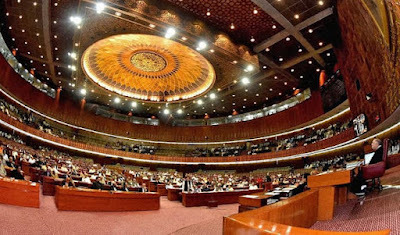
سوال البتہ اخراجات کا نہیں ہے۔ پارلیمان چلانی ہے تو اخراجات تو اٹھیں گے۔احساس کیا جائے تو اخراجات کم ضرور ہو سکتے ہیں لیکن پھر بھی ہوں گے تو سہی۔ اس لیے سوال اخراجات کا نہیں بلکہ کارکردگی کا ہے۔ چارجڈ ماحول میں ایک آدھ اجلاس تلخی اور اودھم کی نذر ہو جائے تو یہ ایک فطری سی بات ہے۔ لیکن اگر یہ مشق مسلسل جاری رہنے لگے تو پھر یہ ایک سوالیہ نشان ہے۔ عالم یہ ہے کہ قومی اسمبلی کے رولز آف بزنس کی دفعہ 5 کے مطابق صرف ایک چوتھائی اراکین بھی موجود ہوں تو کورم پورا تصور کیا جاتا ہے۔ اس کے باوجود ہم اکثر یہ خبر پڑھتے ہیں کہ کورم ٹوٹ گیا اور اجلاس ملتوی ہو گیا۔ گزشتہ سے پیوستہ سابقہ اسمبلی کے 74 فیصد اجلاس کا عالم یہ تھا کہ ان میں حاضری ایک چوتھائی سے بھی کم تھی۔ اس اسمبلی میں پارلیمانی لیڈروں میں سب سے کم حاضریاں عمران خان کی تھیں تو اس کا جواز یہ پیش کیا جاتا تھا کہ وہ اس اسمبلی کو دھاندلی کی پیداوار سمجھتے ہیں لیکن اب جس اسمبلی نے انہیں وزیر اعظم بنایا تو اس میں ان کی دلچسپی کا ��الم یہ تھا کہ پہلے 34 اجلاسوں میں وہ صرف چھ اجلاسوں میں موجود تھے۔
اسمبلی کے رولز آف بزنس کے تحت ارکان کو باقاعدہ چھٹی کی درخواست دینا ہوتی ہے لیکن ریکارڈ گواہ ہے کہ اس تردد میں اراکین اسمبلی تو کیا، خود سپیکر اور ڈپٹی سپیکر بھی نہیں پڑتے۔ ہر محکمے کی چھٹیوں کا کوئی ضابطہ اور تادیب ہے لیکن اراکین پارلیمان سے کوئی سوال نہیں ہو سکتا کہ عالی جاہ آپ کو لوگوں نے منتخب کیا ہے تو اب ایوان میں آ کر اپنی ذمہ داری تو ادا کیجیے۔ یہ خود ہی قانون ساز ہیں اس لیے انہوں نے یہ عظیم الشان قانون بنا رکھا ہے کہ جو رکن اسمبلی مسلسل 40 اجلاسوں میں نہیں آئے گا اس کی رکنیت ختم ہو جائے گی۔ غور فرمائیے مسلسل چالیس اجلاس کی شرط کیسی سفاک ہنر کاری ہے۔ غریب قوم کا یہ حق تو ہے کہ وہ اپنی پارلیمان سے سنجیدگی کی توقع رکھے۔ بنیادی تنخواہ، اس کے علاوہ اعزازیہ، سمپچوری الاؤنس ، آفس مینٹیننس الاؤنس الگ سے ، ٹیلی فون الاؤنس ، اسکے ساتھ ایک عدد ایڈ ہاک ریلیف الائونس، لاکھوں روپے کے سفری واؤچرز، حلقہ انتخاب کے نزدیک ترین ایئر پورٹ سے اسلام آباد کے لیے بزنس کلاس کے 25 ریٹرن ٹکٹ، اس کے علاوہ الگ سے کنوینس الاؤنس، ڈیلی الاؤنس کے ہزاروں الگ سے، اور پھر پارلیمانی لاجز کے باوجود ہاؤسنگ الاؤنس۔
یہی نہیں بلکہ موجودہ اور سابق تمام ارکان قومی اسمبلی اور ان کے اہل خانہ تاحیات 22 ویں گریڈ کے افسر کے برابر میڈیکل سہولت کے حقدار ہیں۔ تمام موجودہ اور سابق اراکین قومی اسمبلی کی اہلیہ اور شوہر تاحیات بلیو پاسپورٹ رکھنے کے بھی مجاز ہیں۔ سپیکر صاحبان نے جاتے جاتے خود کے لیے جو مراعات منظور کیں وہ داستان ہوش ربا اس سب سے الگ ہے۔ مسئلہ پارلیمان کے اخراجات ہی کا نہیں، مسئلہ کارکردگی کا بھی ہے۔ کارکردگی اگر اطمینان بخش ہو تو یہ اخراجات بھی گوارا کیے جا سکتے ہیں۔ لیکن ہماری پارلیمان کی کارکردگی ہمارے سامنے ہے۔ حتیٰ کہ یہاں اب جو طرز گفتگو اختیار کیا جاتا ہے وہ بھی لمحہ ��کریہ ہے۔ وہ زمانے بیت گئے جب نا مناسب گفتگو کو غیر پارلیمانی کہا جاتا تھا۔ اب صورت حال یہ ہے کہ گالم گلوچ اور غیر معیاری خطابات فرمائے جاتے ہیں اور خواتین پر جوتے اچھالے جاتے ہیں۔ پارلیمان کو کسی کارپوریٹ میٹنگ جیسا تو یقینا نہیں بنایا جا سکتا اور اس میں عوامی رنگ بہر حال غالب ہی رہتا ہے لیکن رویے اگر ایک معیار سے گر جائیں تو پھر یہ تکلیف دہ صورت حال بن جاتی ہے۔ پارلیمان اسی بحران سے دوچار ہو چکی ہے۔
سوال اٹھایا جائے تو اراکین پارلیمان جواب آں غزل سناتے ہیں کہ فلاں اور فلاں کے اخراجات بھی تو ہیں۔ معاملہ یہ ہے کہ یہ فلاں اور فلاں کے اخراجات کو بھی ایک حد میں پارلیمان نے ہی رکھنا ہے۔ پارلیمان اگر اپنے اخلاقی وجود کا تحفظ کرے تو پھر وہ اس ذمہ داری کو بھی نبھا سکتی ہے لیکن وہ اگر یہاں بے نیازی کرے تو پھر وہ فلاں اور فلاں کے اخراجات پر سوال نہیں اٹھا سکتی۔ ہمیں اس وقت معاشی مسائل کا حل چاہیے۔ صرف عوام کی رگوں سے بجلی گیس کے بلوں کے نام پر لہو نچوڑ لینا کوئی حکمت نہیں۔ کب تک اور کتنا نچوڑیں گے؟ اصل چیز معاشی بحالی ہے اور اس کے لیے ضروری ہے کہ پارلیمان کا ماحول بہتر ہو اور یہاں سنگین موضوعات پوری معنویت سے زیر بحث آئیں۔
آصف محمود
بشکریہ روزنامہ 92 نیوز
0 notes
Text
Ertuğruloğlu meets with Jalil Abbas Jilani in New York
TRNC Minister of Foreign Affairs, Tahsin Ertuğruloğlu met with his Pakistani counterpart, Jalil Abbas Jilani who was is in New York to attend the annual meetings of the United Nations General Assembly. During the meetings, which took place at the TRNC Representative Office in Turkevi Center, Jilani stated that the state and people of Pakistan will continue to support the friendly and brotherly…
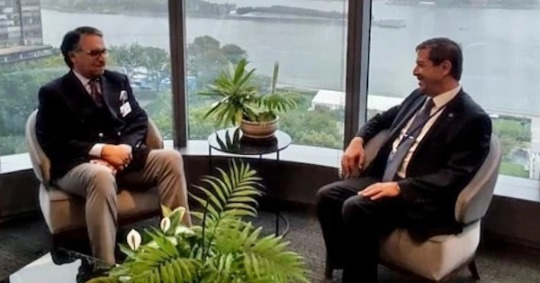
View On WordPress
#Jalil Abbas Jilani#meeting at Turkevi Center#Pakistan Foreign Minister#Tahsin Ertuğruloğlu#TRNC Minister of Foreign Affairs#United Nations General Assembly
0 notes
Text
ایسی اسمبلیوں کی ضرورت کیا ہے؟

اپنی مدت پوری کرنے والی قومی اسمبلی کے 15 مم��ران نے جاتے جاتے تیز ترین قانون سازی کا نیا ریکارڈ قائم کر دیا ہے اور ایک گھنٹے میں 29 بل منظور کر لیے۔ یہ کارنامہ بغیر کورم جاری اجلاس میں انجام دیا گیا جس پر پی ٹی آئی کے ایک منحرف رکن نے اعتراض بھی کیا جس پر اجلاس ملتوی کر دیا گیا۔ تیز ترین قانون سازی کا ایسا ہی ایک ریکارڈ پی ٹی آئی حکومت میں بھی قائم ہوا تھا، جو اب پی ڈی ایم کی اتحادی حکومت نے توڑ دیا ہے اور پیپلز پارٹی سے تعلق رکھنے والے اسپیکر قومی اسمبلی نے صرف 15 ممبران کی موجودگی میں کورم کے بغیر اجلاس جاری رکھ کر حکومت کی مدد کی۔ ارکان قومی اسمبلی نے بنا پڑھے اور بنا دیکھے 24 یونیورسٹیوں اور اداروں کے قیام سے متعلق قانون سازی کر کے نیا ریکارڈ قائم کر دیا۔ ��ومی اسمبلی کے 342 ممبران میں صرف 15 ممبران ہی فالتو تھے یا حکومت کو دستیاب تھے اور باقی سرکاری چھٹی کے باعث اسلام آباد میں ذاتی نوعیت کے کاموں میں مصروف ہوں گے یا تھوڑے ارکان محرم کے باعث اپنے حلقوں میں موجود ہوں گے ورنہ وہ بھی اسلام آباد ہی میں ہوتے، چند دنوں کے مہمان یہ ارکان اسمبلی کیسے پیچھے رہ جاتے۔
ایکسپریس نیوز کے پروگرام ایکسپرٹس میں تجزیہ کاروں نے 15 ممبران کی طرف سے ایک گھنٹے میں 29 بلوں کے پاس کیے جانے کو عوام اور پارلیمنٹ کی توہین قرار دیا ہے جب کہ وہ خود مان رہے ہیں کہ وہ ایوان میں آئے اور انھوں نے کورم کے بغیر بھی قانون سازی کر ڈالی اور قائمہ کمیٹیوں کو بھی زحمت سے بچا لیا کیونکہ قائمہ کمیٹیوں میں بھی یہی ارکان اسمبلی شامل ہیں اور وہ بھی قائمہ کمیٹیوں کے اجلاس کے لیے وقت نہ نکال پاتے۔ قائمہ کمیٹیوں کا وجود بھی ایک تکلف ہی ہے جو قانونی ضرورت تو ہے مگر قائمہ کمیٹیاں بھی انھی ارکان کی ہیں جو ان کمیٹیوں میں نہیں آتے وہاں صرف اپوزیشن کے ارکان آتے ہیں اور قومی اسمبلی کے اجلاس میں بھی زیادہ تعداد اپوزیشن کے ارکان کی ہی ہوتی ہے جب کہ سرکاری ممبران تو ویسے بھی ایوان میں نہیں آتے وہ اکثر اپنے ذاتی کاموں میں مصروف ہوتے ہیں اور وزیر سے ملنے کے لیے دور دراز سے آنے والوں کو بتایا جاتا ہے کہ اندر وزیر موصوف اہم اجلاس میں مصروف ہیں۔ اس لیے ملاقات نہیں ہو سکتی اور چائے پینے یا گپ لگانے کے بعد وزیر موصوف ان ارکان اسمبلی کے ساتھ مخصوص گیٹ سے نکل کر کہیں ظہرانے کے لیے نکل جاتے ہیں اور منتظر افراد کو بتایا جاتا ہے کہ وزیر موصوف کسی اور اہم اجلاس میں شرکت کے لیے دفتر سے نکل گئے ہیں اور لوگ سر پکڑ کر بیٹھ جاتے ہیں۔

پاکستان کی پارلیمنٹ وہ جگہ ہے جس کو وزیر اعظم اہمیت دیتے ہیں نہ ان کے وزرا، تو ارکان کو کیا پڑی کہ وہ ایوان میں جا کر وقت ضایع کریں اسی لیے وہ پارلیمنٹ آ کر اپنی حاضری لگا کر الاؤنسز کھرے کر لیتے ہیں اور ایوان میں کورم کے لیے گھنٹیاں بجائی جاتی رہتی ہیں کیونکہ ایوان میں خالی نشستیں ان ارکان کی منتظر رہتی ہیں اور اکثر اسمبلیوں میں کورم پورا نہیں ہوتا اور حکومت کو بغیر کورم قانون سازی کرانا پڑتی ہے بس اسپیکر یا چیئرمین اپنا ہونا چاہیے کیونکہ اسپیکر اور چیئرمین ہی کورم کے بغیر اجلاس جاری رکھتا ہے کیونکہ یہ اسی کا اختیار ہے۔ سینیٹ اور قومی اسمبلی ہی نہیں صوبائی اسمبلیوں کا بھی یہی حال ہے وہاں کبھی وقت پر ارکان نہیں آتے۔ کورم کے لیے گھنٹیاں بجتی رہتی ہیں اور ارکان خصوصاً حکومتی ارکان کہیں مصروف رہتے ہیں اور وہاں بھی اکثر کورم کا مسئلہ رہتا ہے۔ ارکان پارلیمنٹ کو سرکاری طور پر بیرون ممالک جانے کا بھی موقعہ ملتا ہے جس میں اپوزیشن برائے نام شامل ہوتی ہے اور حکومتی ارکان کی اکثریت غیر ممالک کے دوروں میں شامل ہوتی ہے۔
جس دن 15 ممبران قومی اسمبلی نے تیز ترین قانون سازی کی ان آخری دنوں میں 25 ممبران ڈپٹی اسپیکر کی سربراہی میں ایک ہفتے کے غیر ملکی دوروں پر تھے جن پر کروڑوں روپے خرچ ہوئے جس پر سابق وزیر اطلاعات فواد چوہدری نے تنقید کی مگر وہ بھول گئے کہ ان کی حکومت میں بھی یہی ہوا کرتا تھا ان کے دور میں بھی جلدی میں بل منظور کرا لیے جاتے تھے۔ پارلیمنٹ میں کورم کے بغیر قانون سازی ہوا کرتی تھی۔ ان کا وزیر اعظم بھی پارلیمنٹ کو اہمیت نہیں دیتا تھا اور مہینوں اپنے ہی ارکان کو ملاقات کا وقت نہیں دیتا تھا۔ ہر حکومت میں پارلیمنٹ اور اسمبلیوں کا یہی حال رہا ہے۔ کورم نہ ہونا معمول رہتا ہے۔ ارکان پارلیمنٹ اسی صورت میں ایوان میں آتے ہیں جب انھیں کہیں سے کہہ کر بھجوایا جاتا ہے وہ اپنی مرضی نہیں کسی کی ہدایت پر ایوان میں آتے ہیں۔ سابق وزیر اعظم کے بقول قانون سازی اور بجٹ منظور کرانے کے لیے بھی پارلیمنٹ کے ارکان پر دباؤ ڈلوایا جاتا تھا تو مجبوری میں وہ ایوان میں آتے تھے۔ ارکان پارلیمنٹ اکثر ایوان سے غیر حاضر رہیں، کورم پورا نہ ہوتا ہو، ارکان کو اپنے اصل کام قانون سازی کے لیے ایوان میں آنے کی فرصت ہی نہ ہو تو پھر ایسی پارلیمنٹ اور اسمبلیوں کی ضرورت ہی کیا ہے۔ پارلیمنٹ میں آنے کے خواہش مند اور اسمبلیوں کی ضرورت ہی کیا ہے۔
پارلیمنٹ میں آنے کے خواہش مند اور اسمبلیوں کے ارکان کروڑوں روپے خرچ کرکے منتخب ہوتے ہوں اور رکنیت کا حلف اٹھا کر غائب ہو جاتے ہوں۔ ان کے انتخاب پر حکومت کے بھی اربوں روپے خرچ ہوتے ہیں ملک میں سیاسی انتشار بڑھتا ہے۔ الیکشن کے دنوں میں حکومتی امور متاثر ہوتے ہوں تو پھر ایسی اسمبلیوں کی ضرورت ہی کیا رہ جاتی ہے۔ دوسرے ملکوں میں تو ایسا نہیں ہوتا۔ وہاں الیکشن کے دنوں میں کوئی سرکاری چھٹی نہیں ہوتی اور ایسے اسمبلی الیکشن پاکستان میں ہی ہوتے ہیں۔ ہر اسمبلی الیکشن میں بڑی سیاسی جماعتوں کے علاوہ چھوٹی نامقبول جماعتوں کے ارکان اور آزاد امیدوار تھوک کے حساب سے الیکشن لڑتے ہیں۔ جن میں اکثر کو سیکڑوں ووٹ بھی نہیں ملتے جس کی وجہ سے بیلٹ پیپر پر انتخابی نشانات کی بھرمار ہو جاتی ہے اور ہارنے والے ٹکٹ ہولڈر بن جاتے ہیں کہ انھوں نے بھی اسمبلی الیکشن لڑا ہے تو پھر ایسی اسمبلیوں کا وجود مذاق ہی کہلاتا ہے اور ایسی اسمبلیوں کو عوام اہمیت کیوں دیں؟ یہ اسمبلیاں حکومت کی ضرورت ہیں جن سے عوام کو کوئی فائدہ نہیں ہے۔
محمد سعید آرائیں
بشکریہ ایکسپریس نیوز
0 notes
Text
Did you know that the first map of the Himalayas was made in the 1500s by the Catalan monk Antoni de Montserrat, and it was so accurate that it was used by European expeditions until the 1800s?
Here's the story of a priest that was called by a Mughal emperor for interfaith intercultural dialogue and who ended up being -among other things- a royal teacher, a writer, a geographer, a fake Armenian merchant, and a prisoner.
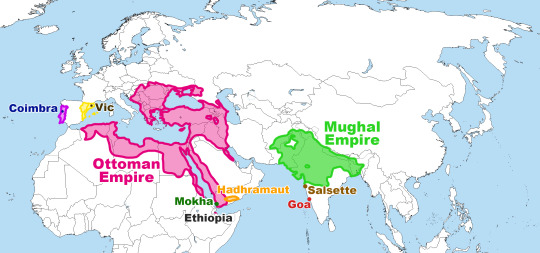
Antoni de Montserrat was born in 1536 in Vic (Catalonia). He studied in Barcelona (Catalonia) and Coimbra (Portugal) to become a priest and joined the Jesuits. In 1574, he was sent on a mission to Goa (back then a Portuguese colony, now part of India).
The Mughal emperor Akbar was an open-minded man. He was Muslim but wanted to learn about the other religions, so he called representatives of different religions to his court in Fatehpur Sikri. In 1579, he called the Jesuits to explain Christianity, and the Jesuits sent Antoni de Montserrat. Everyone in the court -Muslims, Christians, Buddhists, Hindus- knew that the point was not to convert others, but to reach a better understanding through debate.
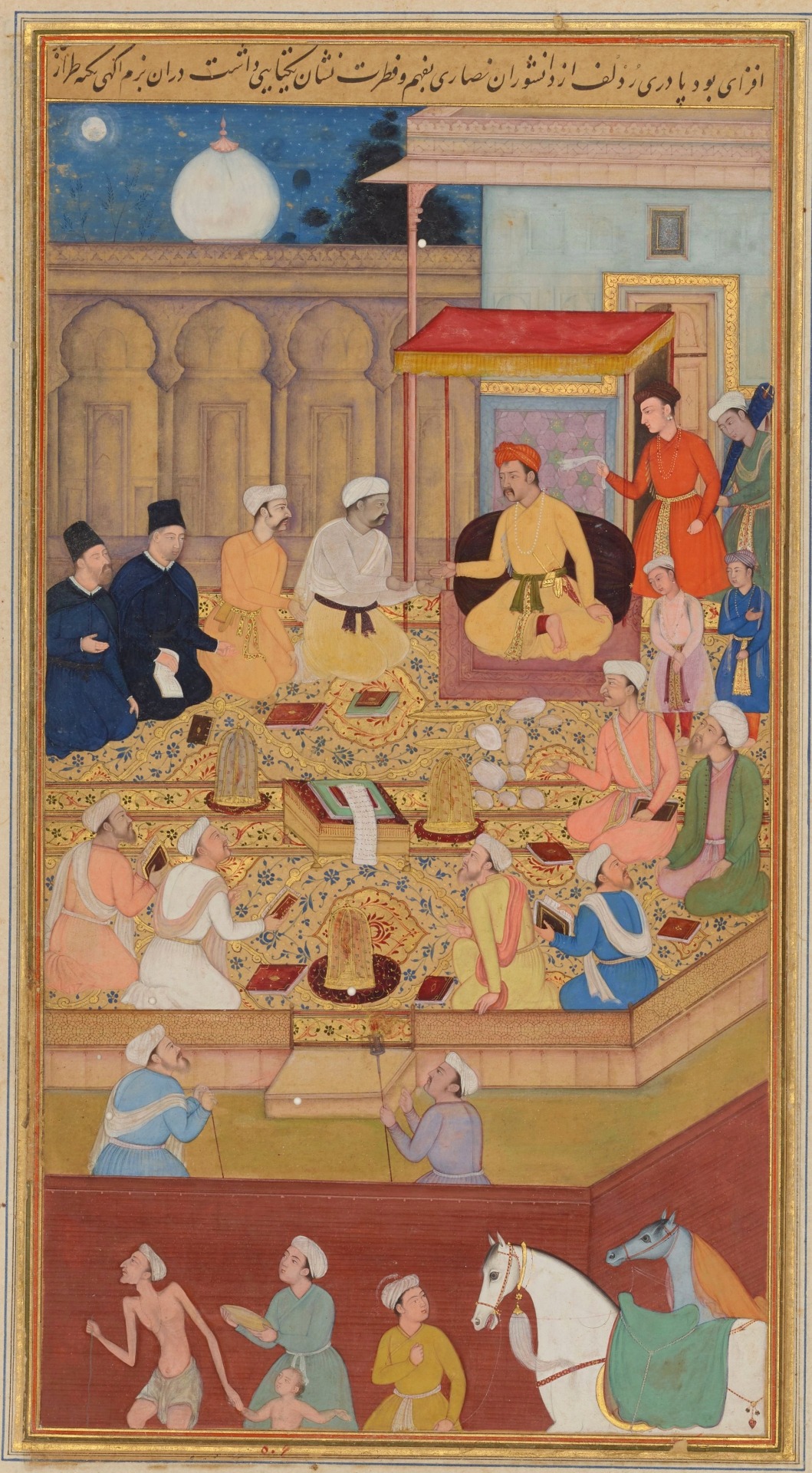
The Mughal emperor Akbar holding an assembly with religious men. The two men dressed in black are Jesuits. Miniature painting by Nar Singh, 1605. Chester Beautty Library.
The emperor Akbar valued Antoni de Montserrat as a great wise man and chose him to become the tutor of his second son Murâd. Antoni learned Persian (the language of the Mughal court) and accepted. He remained close to the emperor and accompanied him in the military campaign when the emperor's step-brother started an uprising in Bengala. Crossing much of Northern India, Kashmir, Pakistan, Afghanistan, and Tibet on elephant gave him the perspective to draw the map.
In the end, Antoni went back to Goa in 1582. There, he wrote a book explaining what he had seen in the Mughal Empire, the cultural differences he had experienced, the political organization of these territories, and describing emperor Akbar's court. This book is called Mongolicae Legationis Commentarius, and its descriptions of the lands he has travelled include the earliest description of Tibetans known in Europe since Marco Polo and the first ever map of the Himalayas.
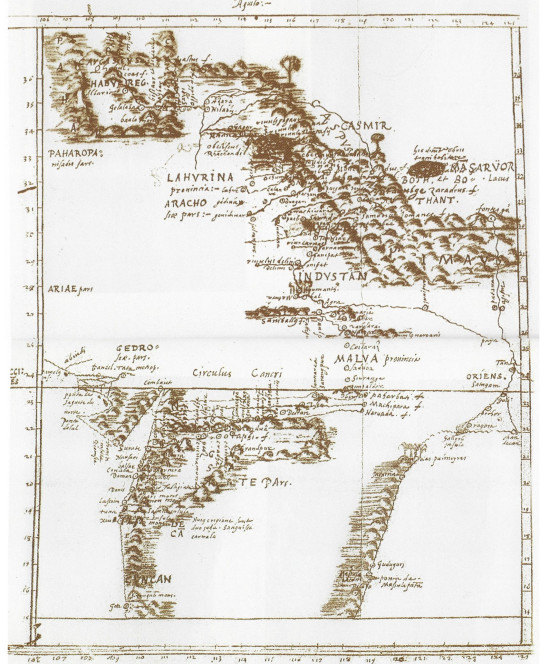
Antoni de Montserrat's map of the Himalayas and their surroundings, including large parts of what nowadays is India, Tibet, Pakistan, and Afghanistan. Library of St. Paul's Cathedral, Kolkata (India).
This book explains cultural elements of the different cultures under the Mughal Empire and also the conversations Antoni had with the emperor about certain habits. For example, Antoni writes about how the Brahmans (upper caste Hindu priests) force widows to be burned alive in the same funeral pyre as their dead husbands, often (when the women resist) drugging them or through violence. Antoni tries to get emperor Akbar to stop this terrible tradition, but doesn't succeed. On the other hand, Antoni also tells the emperor Akbar that they should burn the "men who dress as women" who live in the emperor's court, to which the emperor bursts laughing out loud and doesn't give any consideration to. Despite their different cultural backgrounds, Antoni and Akbar were friends.
Antoni's time in the Mughal Empire ended in 1588, when the king Philip II of Castilla and I of Portugal orders Antoni and a young Spanish priest named Pedro Páez to go to Ethiopia to convince the Coptic Christian Ethiopians to get closer to the Catholic Christian Church. Then, Antoni and Pedro dressed up as an Armenian merchants to border the Ottoman Empire through Iraq, Syria, and Egypt, trying to avoid the pirates of the Indian Ocean. However, before reaching Ethiopia, they took a ship to skirt modern-day Oman, but the captain turned them in as soon as they reached land in Yemen. Then, Antoni and Pedro were taken on a camel caravan to the Sultan of Hadhramaut (Yemen), who imprisoned them until 1595 and then sentenced to galleys in the Red Sea, and later imprisoned them again. Luckily for them, king Philip paid their rescue and they were freed in 1596. With his body weakened by the galleys and the mistreatments of prison, Antoni retired to a convent in Salsette (modern-day Mumbai, India), where he died in 1600 right after having finished his map.
The Spanish priest who travelled with him, Pedro Páez, also wrote his own diary explaining what they lived. With his descriptions, we know that in Yemen Antoni and Pedro were given what he describes as a kind of herbal tea called "cahua, water boiled with a fruit named bun and which is drank very hot, instead of wine": that is a drink that was still unknown in Europe at the time, which we now call coffee.
Maybe you have heard the name Pedro Páez before, too. After accompanying Antoni to Goa, he went to Ethiopia again, successfully this time. In Ethiopia, he became the first European to reach the source of the Blue Nile.
Information sources: David Montserrat Nonó (La Mira), Sociedad Geográfica Española. If you want to read Antoni de Montserrat's book, it has been translated from Latin to Catalan and to Spanish by Josep Lluís Alay.
#història#antoni de montserrat#pedro páez#mughal empire#mughal#history#catalonia#catalan#renaissance#european history#asian history#asia#india#indian history#interfaith#geography#1500s#16th century#travel#other countries
64 notes
·
View notes
Text
I saw a TikTok where a guy asked, “Where are all the other countries sending US disaster aid to help with the hurricanes? You don’t see them, do you? Nooooope.”
Somehow, I remained polite in my response. But the good thing about Tumblr is that I can vent my actual answer, which is:
*raises megaphone*
BITCH, WE ARE ONE OF THE RICHEST MOTHERFUCKING COUNTRIES ON THE PLANET. WE SHOULD BE ABLE TO TAKE CARE OF *OURSELVES*. Y’ALL WANT TO BITCH ABOUT SENDING AID TO UKRAINE AND OH, WE NEED TO TAKE CARE OF AMERICANS FIRST AND THEN A HURRICANE COMES AND YOU WANT TO KNOW WHEN, WHAT, FUCKING BELIZE IS SENDING YOU MONEY?!
MAYBE IF YOU’D LET US TAX THE SHIT OUT OF BILLIONAIRES AND STOP SPENDING ALL OUR MONEY ON MILITARY EQUIPMENT THAT’S OBSOLETE HALFWAY DOWN THE ASSEMBLY LINE WE COULD INVEST MORE IN DISASTER AID. AND MAYBE CONGRESS COULD COME OFF FUCKING VACATION AND DO SOMETHING.
HOWEVER.
SINCE YOU FUCKING ASKED.
OTHER COUNTRIES SEND US HELP FOR DISASTER RELIEF *ALL THE FUCKING TIME*. CANADIAN LINE WORKERS ARE IN NORTH CAROLINA RIGHT NOW. THE MEXICAN ARMED FORCES AND THE DUTCH NAVY HELPED CLEAN UP AFTER KATRINA. KUWAIT GAVE US $400 MILLION IN OIL AFTER KATRINA TO OFFSET OUR LOSSES IN THE GULF. BANGLADESH AND PAKISTAN OFFERED US A MILLION EACH AND WE TURNED THEM DOWN. SWEDEN OFFERED US A SHITLOAD OF NEEDED SUPPLIES AFTER THE BP OIL SPILL AND WE SAT ON THAT OFFER FOR FUCKING WEEKS BEFORE TAKING IT. AND THEN WHEN COUNTRIES OFFER AND ARE LIKE “LOOK, WE’RE POOR, CAN YOU PAY US BACK WHEN YOU GET A CHANCE?” WE TURN OUT OUR POCKETS AND PRETEND LIKE WE HAVEN’T GOT SHIT TO GIVE BACK IN RETURN.
WE GET OFFERS. WE FUMBLE TAKING THEM ALMOST EVERY FUCKING TIME. BECAUSE WE’RE SELFISH SELF-CENTERED CUNTS.
*lowers megaphone*
Ahem. Thank you.
49 notes
·
View notes
Text
The household was fast asleep when the six men broke in. They sought out Sobia Batool Shah, 22, and one of them attacked her with a hatchet, chopping at her limbs in an effort to sever her legs. “He was relentless and must have hit me at least 15 times,” she says. “I screamed in pain and pleaded with him to stop, but he was like a man possessed,” she adds. “I even told him I will not seek a divorce.” Shah was attacked by men from her own family – including her father, Syed Mustafa Shah, her uncle and cousins – who broke into the house, in Naushahro Feroze, in Pakistan’s Sindh province, as “punishment” for refusing to withdraw her application to divorce her husband. ... “It’s all about power control,” says Dr Summaiya Syed Tariq, chief police surgeon in Sindh’s capital, Karachi. Syed Tariq, who also heads the Sindh police medico-legal department, has seen hundreds of women physically and mentally abused, raped, burned and murdered over the last 26 years. “We are nurturing abusers who are worse than animals,” she says. On an average day, the department receives reports of about six cases of sexual violence and 10 to 15 cases of domestic violence across the medico-legal centres at three public hospitals in Karachi. “In the case of sexual violence against minors, my assessment is that for every three cases that come to us, seven more go unreported. And I am not counting the dead bodies that we receive,” Syed Tariq adds. Gender inequality is a global problem, but Pakistan’s indicators reflect especially alarming rates of disparities and violence faced by women. According to this year’s World Economic Forum’s Global Gender Gap report, Pakistan is ranked second from bottom out of 146 countries, behind only Sudan. It ranked 164 out of 193 countries on the 2023-24 UN gender inequality index. Abdullah Lakhair, deputy superintendent of police in Naushahro Feroze, says the victim’s father admitted the attack, telling police his daughter had brought “dishonour” to the family by filing for divorce. She had asked the authorities for protection after her father threatened to kill her previously. “Earlier last month, the district judge had referred her to a women’s shelter, where she stayed for two weeks, but then decided to return to her mother. The incident happened soon after,” Lakhair says. Shah says her father had left her mother and siblings and cut all ties with them. “Had it not been for my maternal grandfather and my uncle, we would not have had a roof over our head all these years. How dare he talk about his honour being sullied by my divorce,” she says. Lakhair says Shah’s father is awaiting sentencing and could face up to 14 years in prison. The incident has sparked angry reactions from the public and civil society organisations in Pakistan. Anis Haroon, a women’s rights activist and former chair of the National Commission on the Status of Women, travelled from Karachi to visit Shah in hospital. She is sceptical about the case sparking any meaningful change. “Like so many harrowing incidents in the past, this will soon be forgotten,” she says. Pakistan has the laws but no “political will” to implement them, she adds. “The legislators think their work ends after laws are passed in assemblies. They fall short of putting efforts towards their implementation,” Haroon says. After the attack on Shah, her mother went to neighbours for help, thinking her unconscious daughter had lost so much blood she must have died. “After giving her immediate medical help, we sent her to Nawabshah, an hour and a half from here,” says Lakhair. “She had to be given 10 bags of blood, which the police arranged. She is in safe hands, for now.” Although her father is in prison awaiting sentencing, Shah has been provided with round-the-clock police protection in the hospital. “My father has been apprehended but his brother has been granted bail. I am very scared,” she says.
54 notes
·
View notes
Text
My Childhood Best Friend is from Palestine
I spent three years of my life in Saudi Arabia. My dad worked for Aramco as a pilot, and we lived in a compound right along the Persian Gulf.
There were kids from all over the world at my school, the school even had an International Day assembly where everyone would represent their countries. It was an amazing experience getting to know people from across the globe, and some of my closest friends were from India, Pakistan, and Indonesia. But the one friend I still talk to to this day, almost 6 years after I moved, is from Palestine.
From my understanding, she is safe and living in Jordan currently, but my heart can't help but ache whenever I hear about what is happening to her country. She loved where she was from, and she was proud to be a Palestinian. I think about her every time I see more news about what's being done to her people, and my heart aches for her.
Last night, I had a dream about her, about Palestine. She looked so heartbroken, but she was fighting for her people. As Israel began to bomb Rafah (currently happening right now), she was there, helping her people get out and to safety. I remember something about crossing into Egypt for safety, and just narrowly avoiding the IOF.
At one point, after the IOF killed or pushed out everyone in the town and kicked them all out of Palestine, there was this moment of despair. The country was lost, and my friend was so distraught. However, the Palestinians rose up and began fighting back. I remember seeing a map that slowly began to show Palestine's control spreading North, with the civilians rising up and fighting for their freedom.
I'm not entirely sure what happened next, but I believe it had a happy ending for Palestine.
Unfortunately, I woke up, and the Palestinians are still suffering as I type this. Cities are being bombed, and the IOF will do anything to ensure a full genocide will play out. People are dying, innocent civilians who lived in a beautiful country are losing their lives for no reason.
This has to end.
Contact your reps, donate to organizations helping Palestine, and spread awareness.
Ceasefire now.
#palestine#free palestine#free gaza#from the river to the sea palestine will be free#i stand with palestine#ceasefire#ceasfire now#israel#genocide#palestinian genocide#gaza#rafah#save rafah#rafah under attack#save palestine#fuck israel#all eyes on palestine#palestinians#gaza genocide#swiftiesforceasefire#swifties for palestine#call for ceasefire#free free palestine#current events#fuck the iof#inshallah#israeli army
105 notes
·
View notes
Text
بجٹ آ گیا : حزب اختلاف کہاں تھی؟
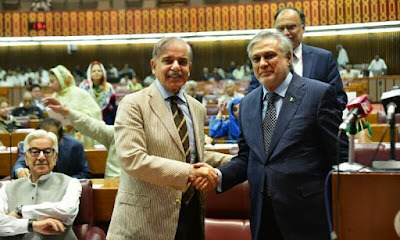
قومی اسمبلی میں وفاقی بجٹ پیش کر دیا گیا، لیکن سوال یہ ہے کہ حزب اختلاف اور قائد حزب اختلاف کہاں تھے؟ روایت تو یہ ہے کہ قومی اسمبلی میں ایک عدد قائد حزب اختلاف تشریف فرما ہوتے ہیں، جنہیں تفنن طبع میں ساتھی پارلیمنٹیرین وفاقی وزیر برائے حزب اختلاف کہتے ہیں۔ کیا ہم جان سکتے ہیں اس بجٹ پر ان کا موقف کیا ہے؟ راجہ ریاض صاحب کے پاس اس بجٹ پر تنقید کرنے کے لیے یا اصلاح احوال کے لیے کچھ تجاویز ہیں؟ یا وہ بھی وزیر خزانہ کو دیکھ کر دل ہی دل میں گنگنا لیتے ہیں: ’ڈار تیرے جانثار بے شمار بے شمار۔‘ نیز یہ کہ ڈار صاحب جواب میں التفات فرماتے ہیں یا وہ اردو کے مسکین اور عزت نفس سے محروم شاعروں کے سنگدل محبوب کی طرح ہیں، جو اپنے چاہنے والوں کو ’پشانتے‘ ہی نہیں۔پارلیمانی جمہوریت صرف حزب اقتدار کا نام نہیں، حزب اختلاف کی بھی اپنی ایک اہمیت ہوتی ہے جو بجٹ جیسے مواقع پر دوچند ہو جاتی ہے۔ ایسے موقع پر اگر حزب اختلاف نام کی کوئی چیز ہی موجود نہ ہو تو یہ نیک شگون نہیں ہوتا۔ بجٹ صرف حکومت کی جانب سے پیش کردہ الفاظ کا گورکھ دھندا نہیں ہوتا، اس میں حزب اختلاف کی مشاورت بھی شامل ہوتی ہے، اس مشاورت کو حکومت سنجیدگی سے نہ لے تو پھر وہ تنقید کر کے عوام کو بتاتی ہے کہ بجٹ میں کیا خامی ہے اور اسے کیسے دور کیا جا سکتا ہے۔
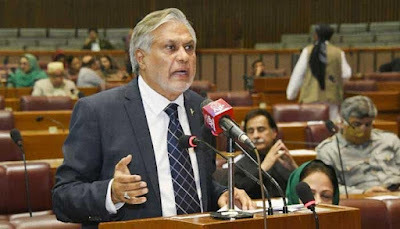
میں کسی اَن دیکھی دنیا کی بات نہیں کر رہا۔ خود سندھ اسمبلی میں حکومت کی حالیہ بجٹ کے حوالے سے یہ قرارداد منظور ہو چکی ہے کہ حزب اختلاف کی سفارشات کا جائزہ لے کر بجٹ بنایا جائے۔ سوال یہ ہے کہ وفاقی بجٹ میں حزب اختلاف کہاں ہے؟ اس کی مشاورت کیا ہوئی؟ اس کا بنایا ہوا متبادل یعنی شیڈو بجٹ کدھر ہے؟ یہ سوالات اصل میں پاکستان تحریک انصاف کے فکری بحران کا اعلانِ عام ہیں۔ کیسی مقبولیت تھی، کاش تھوڑی سی بصیرت بھی منی بس کے روٹ کی طرح ہمراہ ہوتی تو یہ دن نہ دیکھنا پڑتے۔ تحریک عدم اعتماد آتی رہتی ہے، پارلیمانی سیاست کا یہ لازمی جزو ہے۔ عمران پارلیمان میں رہتے تو دھوپ چھاؤں کا آنا جانا لگا رہتا، لیکن یہ سیاسی جماعت تھی ہی کب۔ یہ تو ایک ’کلٹ‘ تھا، جہاں ریڈ لائن ہی نہیں، عقل کا گھنٹہ گھر بھی فرد واحد تھا۔ اس جماعت میں مشاورت کا عالم وہی تھا جو انور مسعود اپنی نظم میں بیان کر چکے۔ کپتان خان انور مسعود کے چوہدری کی طرح پوچھتے تھے: ’اج کیہہ پکائیے؟‘ جواب میں ڈھیر سارے رحمے ایک دوسرے کی طرف دیکھتے اور پھر پکار اٹھتے: ’بجھ لیا کپتان جی چھولیاں دی دال اے۔‘ چھولیاں دی دال یوں کھائی گئی کہ اب بد ہضمی کا شکار انقلابی نونہال پریس کانفرنسوں کے لیے قطاروں میں لگے ہیں۔
یکے بعد دیگرے غلط فیصلے کیے گئے، جیسے کہیں طے کر لیا کہ عقل و شعور کو تو میں نے چھوڑنا نہیں۔ عقل اور سنجیدگی کو دلیپ دوشی سمجھ کر باؤنسر مارے گئے۔ اب ساری پارٹی کا ’مسل پُل‘ ہوا پڑا ہے۔ طنطنے سے استعفے دے کر ایوان کے جو دروازے خود پر بند کیے گئے وہ منتوں ترلوں سے بھی نہیں کھل سکے۔ ملک کے سب سے بڑے صوبے میں حکومت تھی اپنے ہاتھوں ختم کر دی۔ باقی پارٹی بچی تھی، جو غیر سیاسی اور غیر دانشمندانہ افتاد طبع کی نذر ہو گئی۔ خیر خواہانہ تنقید کرنے والوں کو جن کے اشاروں پر گالیوں سے نوازا جاتا تھا وہ خود اب ترین فارم کے آم کھا رہے ہیں۔ سوچنے کی بات ہے کہ اس سارے عمل میں جمہوریت کو کیا ملا؟ سونامی نے آتے وقت بھی جمہوریت اور اہل سیاست کے لیے گنجائش کو محدود سے محدود تر کیا اور اپنی بے بصیرتی سے جاتے ہوئے بھی یہی کام کیا۔ اب ایسا خلا ہے کہ بجٹ دستاویز ایوان میں رکھے ہیں اور حزب اختلاف کا کہیں وجود ہی نہیں کہ اس ڈاکیومنٹ پر کوئی با مقصد گفتگو ہو سکے اور اس میں اصلاح احوال کی کوئی تجویز سامنے آ سکے۔ اور نہیں تو کم از کم اتنا تو ہوتا کہ بجٹ کے دوران تھوڑی رونق ہی لگ جاتی۔
پارلیمان میں کوئی نعرہ بازی ہوتی، کوئی شور مچایا جاتا، پلے کارڈ لے کر وزیر خزانہ کا گھیراؤ ہوتا، ان کی تقریر کے دوران ڈیسک بجائے جاتے۔ کچھ تو ہوتا۔ ایسا ہومیوپیتھک بجٹ بھی بھلا کوئی بجٹ ہوتا ہے۔ پارلیمان سے باہر نکلا تو سامنے ٹریل فائیو تھی۔ ایک دوست ملے۔ ہم نے اکٹھے چائے پی۔ پھر میں نے یہی دکھڑا ان کے سامنے رکھا کہ کہ بجٹ تو آ گیا ہے حزب اختلاف نظر نہیں آ رہی۔ وہ کہاں ہے؟ انہوں نے مسکراتے ہوئے کہا: ’کیا تمہیں حزب اقتدار کہیں نظر آ رہی ہے؟ کیا تم بتا سکتے ہو وہ کہاں ہے؟‘ میں نے گھبرا کر ادھر ادھر دیکھا۔ سامنے مارگلہ کا جنگل تھا۔ جنگل میں ہُو کا عالم تھا۔
آصف محمود
بشکریہ انڈپینڈنٹ اردو
0 notes
Text





















Today is the International Day of the Markhor!
On May 2, 2024, the United Nations General Assembly adopted a resolution declaring May 24 the International Day of the Markhor. The markhor is a species of wild goats native to the mountains of Central and South Asia, including Pakistan, where it is the national animal. Its majestic appearance is characterized by its stunning corkscrew horns, which can grow to over five feet in length. Sadly, there are less than 6,000 adult markhors in the world; they have fallen victim to illegal hunting and poaching, as well as loss of their habitat, and are classified as "near threatened". It is hoped that the International Day of the Markhor will bring awareness of these amazing creatures and help preservation efforts.
43 notes
·
View notes